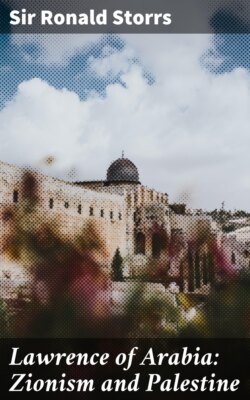Читать книгу Lawrence of Arabia: Zionism and Palestine - Sir Ronald Storrs - Страница 4
На сайте Литреса книга снята с продажи.
T. E. LAWRENCE
BIOGRAPHICAL SUMMARY
ОглавлениеTable of Contents
Thomas Edward Lawrence—always Ned to his family—was born the second of five sons at Tremadoc, in Wales, on August 16, 1888 (Napoleon’s birthday), of an Anglo-Irish father and a Highland Scottish mother. He was educated at the Oxford High School for Boys, where he was already developing “a passionate absorption in the past: in heraldry, arms and armour, monumental brasses, castles, ruins, church architecture, old coins, and every fragment of brick or pottery which might throw light on the social history and ways of living of mankind”.[1] He went on to Jesus College, Oxford, and gained a scholarship at Magdalen College which enabled him, under the famous archaeologist-arabist, D. G. Hogarth, to follow his bent in the Near and Middle East. In November 1914 he was appointed to the Intelligence Department of the Egyptian Expeditionary Force, Cairo. The author, seven years his senior, had preceded him there by ten years, of which he had served five in the Egyptian Government and five as Oriental Secretary to the British Agency, latterly under Lord Kitchener. By the time of Lawrence’s arrival Great Britain, in retaliation for Turkish German-urged hostility, had declared Egypt (of which Turkey had been suzerain) a British Protectorate. The title of the Egyptian sovereign, Khedive, had been raised to Sultan; that of the British Representative from Agent and Consul-General to High Commissioner, his residence from Agency to Residency;[2] and this was the political status of Egypt throughout the Arabian campaigns. For Lawrence’s taking over and conduct of these, the major document must always be his Seven Pillars of Wisdom, until his death only available to the public in the abridged Revolt in the Desert; to both of which, but particularly Seven Pillars, the reader is referred.
After the British and Arab entry into Damascus Lawrence left the Army and served first in the Royal Tank Corps, then in the Royal Air Force, latterly as an Inspector (and perfector) of high-power motor-craft. He was retired in 1935 at the age of forty-six. On May 6, 1935, swerving his motor-cycle to avoid two boys riding abreast, he was violently thrown and met his death.
[1] Letters of T. E. Lawrence. Edited by David Garnett, p. 39.
[2] After the War all three were further promoted. The Sultan became King, the High Commissioner, Ambassador, and the Residency, Embassy.
